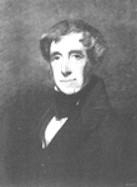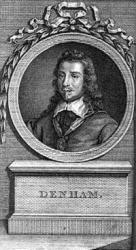Planning worship?
Check out our sister site, ZeteoSearch.org,
for 20+ additional resources related to your search.
- |
User Links
Person Results
‹ Return to hymnal


Export as CSV
C. C. Moore

1770 - 1863 Hymnal Number: 322 Author of "For an orphan and widow institution" in A Selection of Hymns and Psalms, for Social and Private Worship. (11th ed.) Moore, Clement Clarke, LL.D., son of Bp. B. Moore, was born in New York, July 15, 1779, and educated at Columbia College, In 1821 he became Professor of Biblical Learning in the General Theological Seminary, N. York; subsequently of Hebrew and Greek; and then of Oriental and Greek Literature. He died at Newport, Rhode Island, July 10, 1863. His Poems were published in 1844. One of his hymns, "Lord of life, all praise excelling" (Harvest), is widely known, both in its full form, and abbreviated as "When the harvest yields the pleasure." It first appeared as one of the thirty hymns added to the American Prayer Book Collection in 1808.
--John Julian, Dictionary of Hymnology, Appendix, Part II (1907)
C. C. Moore
James Arbuckle
1700 - 1734 Person Name: Arbuckle Hymnal Number: 91 Author of "My heart, and all my ways, O God" in A Selection of Hymns and Psalms, for Social and Private Worship. (11th ed.)
James Arbuckle
Pendlebury Houghton
1758 - 1824 Hymnal Number: 331 Author of "Blest hour, when virtuous friends shall meet" in A Selection of Hymns and Psalms, for Social and Private Worship. (11th ed.) Houghton, Pendlebury, 1758-1824. Minister at the Octagon Chapel, Norwich, and from 1812-1823 at Paradise Street Chapel, Liverpool. His hymn on The reunion of friends after death, "Blest be the hour when friends shall meet," is in Martineau’s Hymns for the Christian Church and Home, Martineau’s Hymns of Praise and Prayer, and J. P. Hopp’s Collection, 1877; Sometimes as:— "Blest hour when virtuous friends shall meet."
--John Julian, Dictionary of Hymnology (1907)
Pendlebury Houghton
John Denham

1615 - 1668 Hymnal Number: 219 Author of "From depths of sadness and distress" in A Selection of Hymns and Psalms, for Social and Private Worship. (11th ed.) Denham, Sir John, only son of Sir John Denham, Chief Baron of the Exchequer, and afterwards Chief Justice of the King's Bench, Ireland, born in Dublin, 1615, and educated at Trinity College, Oxford. In 1641 he was made governor of Fareham Castle for Charles I., and subsequently attended Charles II. in his exile. At the Restoration he was rewarded for his devotion to the Crown, and created a Knight of the Bath. Died in London, 1668, and was buried in Westminster Abbey. His poem, Cooper's Hill, is well known. The manly energy and nervous force of his verse was much more popular with Pope and Johnson and the 18th century school, than it is at the present time. His Version of the Psalms was written about 1668, but not published until 1714.
-- John Julian, Dictionary of Hymnology (1907)
John Denham
George Walker
1734 - 1807 Hymnal Number: 166 Author of "Enough of life's vain scene I've trod" in A Selection of Hymns and Psalms, for Social and Private Worship. (11th ed.) Walker, George, F.R.S., born 1735, at Newcastle-on-Tyne, educated by his uncle, Thomas Walker, dissenting minister at Durham, whom, after further study at Dr. Rotherhain's academy at Kendal, and at Edinburgh and Glasgow, he succeeded in the pulpit there. From Durham Walker removed to Great Yarmouth, and thence in 1772 to the Warrington Academy. While there he published The Doctrine of the Sphere. This and his Treatise on Conic Sections are the chief of his mathematical works. From 1774 to 1798 he was minister at the High Pavement Chapel, Nottingham, and took a prominent part in the public life of the town. His sermons on political events of the time attracted widespread attention, as did his tract The Dissenters’ Plea; or, an appeal of the Dissenters to the Justice, Honour, and Religion of the Kingdom against the Test Laws. This and other essays on religious and philosophical questions were republished after his death in two volumes of Essays on Various Subjects, with a Memoir, 1809. Four volumes of Sermons on Various Subjects were also published (1808), the first two volumes having first appeared in 1790, during his Nottingham ministry. In 1798 he removed to Manchester, as Professor of Theology in the recently founded Manchester Academy and also became president of the Philosophical and Literary Society. His health giving way he spent the last months of his life in the neighbourhood of Liverpool, and died in 1807, while on a visit to London. He was buried in Bunhill-fields. For his Nottingham congregation Walker published A Collection of Psalms and Hymns for Public Worship, unmixed with the disputed doctrines of any sect. Warrington, Printed by W. Eyres, for the Editor. 1738. This is one of the chief of the collections made for congregations of Presbyterians in the period of their transition towards Unitarianism. Of the 387 psalms and hymns 141 are taken from Watts, and of the rest the names of 24 authors are given, including T. Scott, Barbauld and Kippis. Walker himself, holding a "tempered Arianism," freely altered the hymns adopted, both for doctrinal reasons, and "to improve the style" of the compositions. He also contributed hymns of his own. Of these the best known are:—
1. Enough of life's vain scene I've trod.
2. Though many faults do me reprove. Part of "How foolish to oppose to God."
3. The earth proclaims its Lord. [Rev.Valentine D. Davis, B.A.]
-- John Julian, Dictionary of Hymnology (1907)
George Walker


 My Starred Hymns
My Starred Hymns


